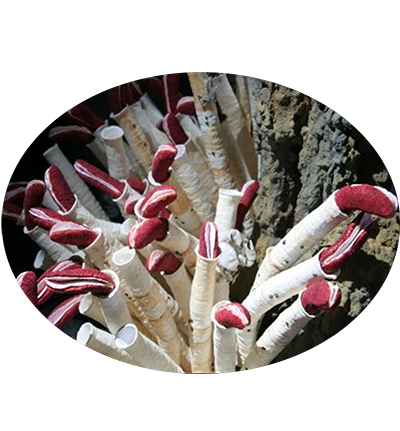
Riftia pachyptila, commonly known as the giant tube worm, is a marine invertebrate in the phylum Annelida. It inhabits hydrothermal vent ecosystems on the Pacific Ocean floor, where temperatures range from 2 to 30 °C. This species can tolerate extremely high hydrogen sulfide levels and relies entirely on symbiotic sulfur-oxidizing bacteria housed in its trophosome for nutrition. These worms can grow up to 3 meters in length, with tubular bodies reaching a diameter of 4 cm, making them one of the most iconic organisms in deep-sea vent ecosystems.
Animalia (Kingdom); Annelida (Phylum); Polychaeta (Class); Sedentaria (Subclass); Canalipalpata (Infraclass); Sabellida (Order); Siboglinidae (Family); Riftia (Genus); Riftia pachyptila (Species)
Riftia pachyptila Jones, 1981
1. Jones M L. Riftia pachyptila, new genus, new species, the vestimentiferan worm from the Galapagos Rift geothermal vents (Pogonophora)[J]. 1981. (Jones et al., 1981)
Galapagos Rift, Rose Garden geothermal vent 0.8042 (0° 48' 15" N) -86.2247 (86° 13' 29" W), 2,450 meters
| Species | Phylum | Common Name | Ecosystem | Depth | Habitat | NCBI Taxonomy ID |
|---|---|---|---|---|---|---|
| Riftia pachyptila | Annelida | Cold seep, Deep sea, Vent field | 2,514 | hydrothermal vent site Tica, East Pacific Rise (Alvin dive 4839, 9°50.398′N, 104°17.506′W) | 6426 |
| Genome Assembly | Genome Size | Assembly level | Released year | WGS accession | Submitter | BioProject | BUSCO completeness (%) | Scaffold/Contig N50 (kb) | GC content (%) | Repeat Rate (%) | Gene Number |
|---|---|---|---|---|---|---|---|---|---|---|---|
| - | 554Mb | Contig | 2023 | - | QUEEN MARY UNIVERSITY OF LONDON | PRJEB55047 | 99.37 | 2870 | 40.49 | 29.99 | 37,037 |
| Title | Journal | Pubmed ID |
|---|---|---|
| Distinct genomic routes underlie transitions to specialised symbiotic lifestyles in deep-sea annelid worms | nature communications | 37198188 |
| Gene ID | Description |
|---|---|
| RPACG16984.1 | - |
| RPACG16985.1 | - |
| RPACG16986.1 | - |
| RPACG16987.1 | - |
| RPACG16988.1 | - |
| RPACG16989.1 | - |
| RPACG16990.1 | - |
| RPACG16991.1 | - |
| RPACG16992.1 | - |
| RPACG16993.1 | - |
| RPACG16994.1 | - |
| RPACG16995.1 | THAP4 PROTEIN |
| RPACG16995.2 | - |
| RPACG16996.1 | CYSTEINE PROTEASE ATG4 |
| RPACG16997.1 | CYSTEINE PROTEASE ATG4 |
| RPACG16998.1 | SIMILAR TO CHROMOSOME 3 OPEN READING FRAME 20 |
| RPACG16999.1 | RHOMBOID PROTEASE |
| RPACG16999.2 | - |
| RPACG16999.3 | - |
| RPACG17000.1 | FTP DOMAIN-CONTAINING PROTEIN |

